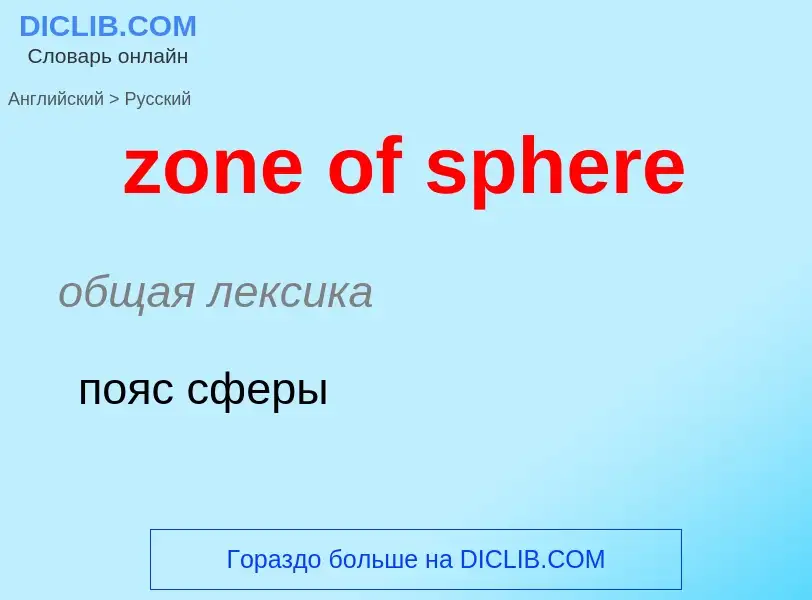Traduction et analyse de mots par intelligence artificielle ChatGPT
Sur cette page, vous pouvez obtenir une analyse détaillée d'un mot ou d'une phrase, réalisée à l'aide de la meilleure technologie d'intelligence artificielle à ce jour:
- comment le mot est utilisé
- fréquence d'utilisation
- il est utilisé plus souvent dans le discours oral ou écrit
- options de traduction de mots
- exemples d'utilisation (plusieurs phrases avec traduction)
- étymologie
zone of sphere - traduction vers russe
общая лексика
пояс сферы
['sferik-{'sferik}(ə)l]
общая лексика
поплавковый
сферический
шаровидный
шаровой
шарообразный
прилагательное
общая лексика
шарообразный
сферический
небесный
относящийся к небесным телам
небесный (о знаках и т. п.; в астрологии)
сферический, шарообразный
математика
шаровой
математика
сферическая поверхность
Définition
.
Wikipédia

In the field of international relations, a sphere of influence (SOI) is a spatial region or concept division over which a state or organization has a level of cultural, economic, military or political exclusivity.
While there may be a formal alliance or other treaty obligations between the influenced and influencer, such formal arrangements are not necessary and the influence can often be more of an example of soft power. Similarly, a formal alliance does not necessarily mean that one country lies within another's sphere of influence. High levels of exclusivity have historically been associated with higher levels of conflict.
In more extreme cases, a country within the "sphere of influence" of another may become a subsidiary of that state and serve in effect as a satellite state or de facto colony. This was the case with the Soviet Union and its Eastern Bloc after World War II. The system of spheres of influence by which powerful nations intervene in the affairs of others continues to the present. It is often analyzed in terms of superpowers, great powers, and/or middle powers.
Sometimes portions of a single country can fall into two distinct spheres of influence. In the 19th century, the buffer states of Iran and Thailand, lying between the empires of Britain, France and Russia, were divided between the spheres of influence of those three international powers. Likewise, after World War II, Germany was divided into four occupation zones, three of which later consolidated into West Germany and the remaining one became East Germany, the former a member of NATO and the latter a member of the Warsaw Pact.
The term is also used to describe non-political situations, e.g., a shopping mall is said to have a 'sphere of influence' that designates the geographical area where it dominates the retail trade.



![Russia]] over influence in [[Central Asia]] Russia]] over influence in [[Central Asia]]](https://commons.wikimedia.org/wiki/Special:FilePath/Great Game cartoon from 1878.jpg?width=200)

![Map of Africa in 1897 shows European "sphere[s] of influence". Map of Africa in 1897 shows European "sphere[s] of influence".](https://commons.wikimedia.org/wiki/Special:FilePath/Map of colonial Africa in 1897.jpg?width=200)

![Roundest objects in the world created]. Roundest objects in the world created].](https://commons.wikimedia.org/wiki/Special:FilePath/Einstein gyro gravity probe b.jpg?width=200)
![Deck of playing cards illustrating engineering instruments, England, 1702. [[King of spades]]: Spheres Deck of playing cards illustrating engineering instruments, England, 1702. [[King of spades]]: Spheres](https://commons.wikimedia.org/wiki/Special:FilePath/King of spades- spheres.jpg?width=200)
